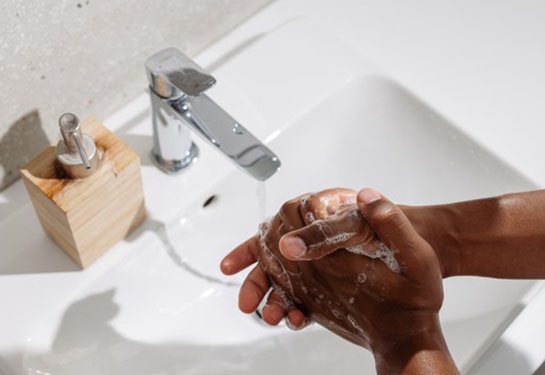Strep Throat
When you have a sore throat, we’re here to help. At UC Davis Health, our team works to get you back to good health quickly.
Medically reviewed by Natasha Nakra, M.D. on Aug. 25, 2023.

What Is Streptococcus pyogenes?
Streptococcus pyogenes (S. pyogenes) is a bacteria that causes strep throat (acute pharyngitis) and other infections. It’s also called group A streptococcus (group A strep or GAS).
You can become infected by Streptococcus pyogenes through exposure to someone who carries the bacteria or is already sick.
UC Davis Health providers offer timely diagnosis and treatment of Streptococcus pyogenes infection. Our caring team ensures you get prompt care for this infectious disease, minimizing your risk of any complications.
Symptoms of Strep Throat
Strep throat symptoms usually start 2 to 5 days after exposure to the bacteria.
Oral Symptoms
Some of the most obvious signs of acute pharyngitis appear in your mouth and throat:
- Painful swallowing
- Red spots on the roof of your mouth (petechiae)
- Sore throat, often red with white patches
- Swollen lymph nodes in your neck
Bodily Symptoms
Symptoms of Streptococcus pyogenes infection can also appear throughout your body, including:
- Body aches
- Chills
- Headache
- Fever of 101 degrees F or higher
- Loss of appetite
- Nausea and vomiting
- Stomach pain
Causes of Strep Throat
Exposure to Streptococcus pyogenes bacteria causes strep throat. The most common causes of group A strep infection include:
Breathing It In
You may breathe in S. pyogenes through respiratory droplets in the air. These form when an infected person coughs, sneezes or talks.
Direct Contact
You may get S. pyogenes by coming in contact with infected sores (impetigo) on someone’s skin. The fluid from these sores is also infectious.
Sharing Items
You may contract group A strep by sharing a glass, food, utensils or toothbrush with someone who has an infection.
Strep Throat Risk Factors
Your chances of getting strep throat may be higher if you have one or more of these risk factors:
Age
Children between ages 5 and 15 are at greater risk of strep throat, although it can affect people of all ages
Close Contact
Being near someone who has strep throat increases your risk.
Crowded Settings
Spending time with large groups of people, such as in daycare or schools, raises your risk of infection.
Frequent Contact with Children
Having a lot of contact with children, such as through teaching or in healthcare settings, raises your infection risk.
Having a School-Aged Child
Being the parent of a child in daycare or school increases your chances of S. pyogenes infection.
Strep Throat Diagnosis and Testing
To diagnose strep throat, we will first ask about your health history and symptoms. Then we will do a physical examination. If we suspect strep throat, we may suggest the following tests:
- Rapid strep test: We check for group A strep by sampling the back of your throat with a cotton swab. It takes 20 minutes or less for a result.
- Throat culture: A throat culture can sometimes find bacterial infection missed by a rapid strep test. We send the swab to a lab to see whether S. pyogenes bacteria can be grown on a culture dish. It takes 1 to 2 days for a result.
Strep Throat Treatments at UC Davis Health
Most strep throat treatments last for about 10 days. You should start to feel better around 1 to 2 days after treatment starts. Treatments we use for strep throat include:
Antibiotics
An antibiotic taken by mouth (oral antibiotic) decreases the length of time you are sick. It also reduces symptoms and complications such as rheumatic fever.
Pain Relievers
Over-the-counter pain relievers can help manage symptoms such as fever and sore throat. This category of medication includes nonsteroidal anti-inflammatory drugs (NSAIDs) and acetaminophen.
Preventing Strep Infection
There are certain steps you can take to reduce your risk of an S. pyogenes infection:
Don’t Share Food or Items You Place In Your Mouth
When someone who is ill uses cups, plates or utensils, you can reduce your risk of infection by avoiding sharing these items and washing them thoroughly.
Keep Your Distance
Staying away from people who have signs of strep throat can lessen your chances of getting this illness.
Wash Your Hands
You can reduce your infection risk by washing your hands with soap and water, especially before making food or eating.
Streptococcus pyogenes causes
616MCases of pharyngitis (sore throat) worldwide each year
Source: Ibrahim J, et al. Genome Analysis of Streptococcus Pyogenes Associated With Pharyngitis and Skin Infections. PLoS One. 2016 Dec 15;11(12):e0168177.
Request an Appointment
As Sacramento's No. 1 hospital, you'll benefit from unique advantages in primary care and specialty care. This includes prevention, diagnosis and treatment options from experts in 150 specialties.
Referring Physicians
To refer a patient, submit an electronic referral form or call.
800-4-UCDAVIS
Patients
Call to make an appointment.
Consumer Resource Center
800-2-UCDAVIS

Ranked among the nation’s best hospitals
A U.S. News & World Report best hospital in cardiology, heart & vascular surgery, diabetes & endocrinology, ENT, geriatrics, neurology & neurosurgery, and pulmonology & lung surgery.

Ranked among the nation’s best children’s hospitals
U.S. News & World Report ranked UC Davis Children’s Hospital among the best in pediatric nephrology, orthopedics*, and pulmonology & lung surgery. (*Together with Shriners Children’s Northern California)

Ranked Sacramento’s #1 hospital
Ranked Sacramento’s #1 hospital by U.S. News, and high-performing in aortic valve surgery, back surgery (spinal fusion), COPD, colon cancer surgery, diabetes, gynecological cancer surgery, heart arrhythmia, heart failure, kidney failure, leukemia, lymphoma & myeloma, lung cancer surgery, pacemaker implantation, pneumonia, prostate cancer surgery, stroke, TAVR, cancer, orthopedics, gastroenterology & GI surgery, and urology.

The nation’s highest nursing honor
UC Davis Medical Center has received Magnet® recognition, the nation’s highest honor for nursing excellence.

World-class cancer care
One of ~59 U.S. cancer centers designated “comprehensive” by the National Cancer Institute.

A leader in health care equality
For the 13th consecutive year, UC Davis Medical Center has been recognized as an LGBTQ+ Healthcare Equality Leader by the educational arm of America’s largest civil rights organization.

